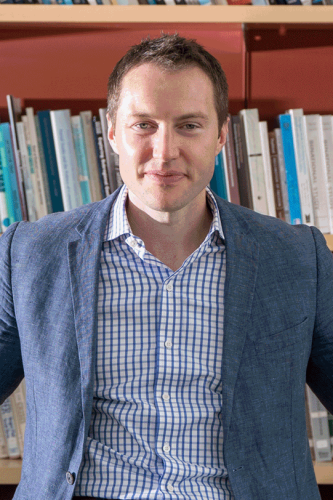
Robert Blair
Biography
Robert Blair is the Arkadij Eisler Goldman Sachs Associate Professor of Political Science and International and Public Affairs at Brown University. His research focuses on international intervention and the consolidation of state authority after civil war, with an emphasis on rule of law and security institutions. He is director of the Civil Conflict and Democratic Erosion Policy Lab at Brown and co-founder and co-director of the Democratic Erosion Consortium, a multi-country initiative that addresses the causes and consequences of democratic deconsolidation through a combination of teaching, research, and civic and policy engagement. He has conducted fieldwork on these and related topics in Colombia, Brazil, Liberia, Uganda, Côte d'Ivoire, and the US. He has also worked in various capacities for the UN Office of Rule of Law and Security Institutions, the US Central Intelligence Agency’s Political Instability Task Force, USAID, Freedom House, and the Small Arms Survey. He holds a B.A. from Brown and a Ph.D in political science from Yale University. His research is published or forthcoming in Science, Nature Human Behaviour, American Political Science Review, American Journal of Political Science, Journal of Politics, British Journal of Political Science, Quarterly Journal of Political Science, Comparative Political Studies, World Politics, International Organization, International Studies Quarterly, and other venues. His book, Peacekeeping, Policing, and the Rule of Law after Civil War, was published in 2020 with Cambridge University Press.
Research
Blair's research focuses on international intervention and the consolidation of state authority after civil war, with an emphasis on rule of law and security institutions. He is director of the Civil Conflict and Democratic Erosion Policy Lab at Brown and co-founder and co-director of the Democratic Erosion Consortium, a multi-country initiative that addresses the causes and consequences of democratic deconsolidation through a combination of teaching, research, and civic and policy engagement.
Publications
“UN Peacekeeping and Democratization in Conflict-Affected Countries” (with Jessica Di Salvatore and Hannah Smidt). 2023. American Political Science Review 117(4): 1308-1326
“Little Evidence That Military Policing Reduces Crime or Improves Human Security” (with Michael Weintraub). 2023. Nature Human Behaviour 7(6): 861-873
“Preventing Rebel Resurgence after Civil War: A Field Experiment in Security and Justice Provision in Rural Colombia” (with Manuel Moscoso, Andrés Vargas, and Michael Weintraub). 2022. American Political Science Review 116(4): 1258-1277
“Civil War and Citizens’ Demand for the State: An Empirical Test of Hobbesian Theory.” 2022. British Journal of Political Science 52(4): 1748-1768
“The Promise and Pitfalls of Conflict Prediction: Evidence from Colombia and Indonesia” (with Samuel Bazzi, Christopher Blattman, Oeindrila Dube, Matthew Gudgeon, and Richard Peck). 2022. Review of Economics & Statistics 104(4): 764-779
“When Do UN Peacekeeping Operations Implement Their Mandates?”(with Jessica Di Salvatore and Hannah Smidt). 2022. American Journal of Political Science 66(3): 664-680
“Foreign Aid and Soft Power: Great Power Competition in Africa in the Early 21st Century” (with Robert Marty and Philip Roessler). 2022. British Journal of Political Science 52(3): 1355-1376
Teaching
POLS1440: "Security, Governance, and Development in Africa"
POLS1820X: "Democratic Erosion"
POLS1824: "Post-Conflict Politics"
POLS 2110: "Proseminar in Comparative Politics"
POLS2590: "Quantitative Research Methods II"